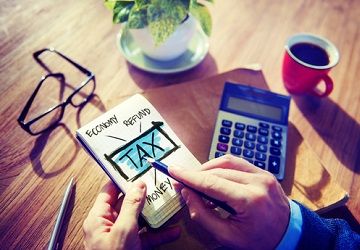- Best Practices New Normal
- Digital Dentistry
- Data Security
- Implants
- Catapult Education
- COVID-19
- Digital Imaging
- Laser Dentistry
- Restorative Dentistry
- Cosmetic Dentistry
- Periodontics
- Oral Care
- Evaluating Dental Materials
- Cement and Adhesives
- Equipment & Supplies
- Ergonomics
- Products
- Dentures
- Infection Control
- Orthodontics
- Technology
- Techniques
- Materials
- Emerging Research
- Pediatric Dentistry
- Endodontics
- Oral-Systemic Health
Make the Section 179 Deduction Work For Your Practice
The Section 179 tax deduction allows dentists to save big on major equipment and software purchases, but is it right for your practice? And while the deduction has been promoted as an end-of-the-year tax strategy, it should more accurately be positioned as part of your practice's overall objective.

The IRS allows you to deduct all of your equipment on some basis, so if you don’t do a 179 it doesn’t mean you don’t get to deduct it.
December 31, 2017, has come and gone, so it’s time to put any thoughts about taking advantage of the Section 179 deduction in the rearview mirror, right?
Well, not so fast. Basically, Section 179 of the IRS tax code allows businesses to deduct the full purchase price of qualifying equipment and software purchased or financed during the tax year. To take this deduction for tax year 2017, the equipment must have been purchased and put into service during 2017.
But does that mean dentists should simply forget about 2018? Or beyond?
“What I don’t like is when some dental reps use [the 179 deduction] as an end-of-the-year sales tool,” says Dawn Renner, CPA, MBA, a member of the National Society of Certified Healthcare Business Consultants and owner of the Minnetonka, Minnesota-based Management Accounting Group, Ltd. “And sometimes the 179 has some negative, unintended consequences.”
A NECESSARY PURCHASE?
Renner explains that dental reps are not the only guilty party when it comes to “pushing” the 179 deduction. Some accountants who want to save their dental clients lots of money one year also contribute to the problem.
“You can look like a hero that one year, but when the dentist has to pay the principal on that purchase in year two and three and four and doesn’t have any deduction to offset it, that’s not a good thing,” Renner says.
That creates a “double whammy” on cash flow, Renner continues. Dentists could find themselves paying out principal but also paying tax on that principal. The other consideration is whether or not your state allows a 179 deduction.
“I’m in Minnesota,” Renner says, “and the state does not allow the same deduction as the Federal.”
Perhaps most importantly, Renner suggests dentists step back and ask themselves if they would make the purchase regardless of the time of year. The website Section179.org explains that most tangible goods, including off-the-shelf software and business-use vehicles qualify for the 179 deduction. But do you need to make that purchase?
“Even if you don’t get the 179, you buy the equipment, you get to deduct 100 percent of it,” Renner says. “It’s just a timing thing.”
PUT TO USE
It’s important to remember the qualifier that whatever the purchase, it must be put into service during that tax year. So just because you purchase a new piece of equipment or invest in new practice management software in December, you won’t be able to deduct the full price if you don’t implement its usage before the end of the month. And with some new equipment and/or software, training is involved. That could run well into the start of the New Year.
“It’s one of those things that we have some control over to make it fit the situation that’s best for each of our clients,” Renner says. “So if you rush to buy something in December and can’t put it to use, you won’t be able to deduct it anyway.”
And then there’s the question of whether it makes more sense to take the deduction in one lump sum or to depreciate over time. Renner suggests that for a new start-up practice, or one that might be in its first year or two of existence, there might be more “bang for the buck” by depreciating the purchase over a longer period of time.
“In the first couple of years the practice won’t be at its highest earnings potential,” she says. “You’re still building the practice. And with the depreciation, you can never deduct more of a loss than you have basis or skin in the game. So if you don’t have a lot of equity, you can’t take all of your depreciation.”
BONUS TIME
The other consideration where the Section 179 deduction is concerned is the possibility of bonus depreciation. There are some years it’s offered, and some it isn’t. For 2017 the bonus depreciation is offered at 50 percent. It’s useful because it accelerates the deduction by front-loading the depreciation in the first few years. However, it only covers new equipment.
Does your practice qualify? For 2017, the Section179.org indicates that “All businesses that purchase finance, and/or lease less than $2 million in new or used business equipment during tax year 2017 should qualify” for the deduction. To be certain, Renner says it’s worth a 10- or 15-minute conversation with your tax professional to make sure you use the deduction in the most efficient manner possible.
“The IRS allows you to deduct all of your equipment on some basis, so if you don’t do a 179 it doesn’t mean you don’t get to deduct it,” Renner says. “It needs to work for you.”
Click here to sign up for more Dentist's Money Digest content and updates.
RELATED:
More Coverage on
·
Longevity Insurance Is Underused in Retirement Planning
·
Dentist Promotes the Connection Between Nutrition and Oral Health
·
